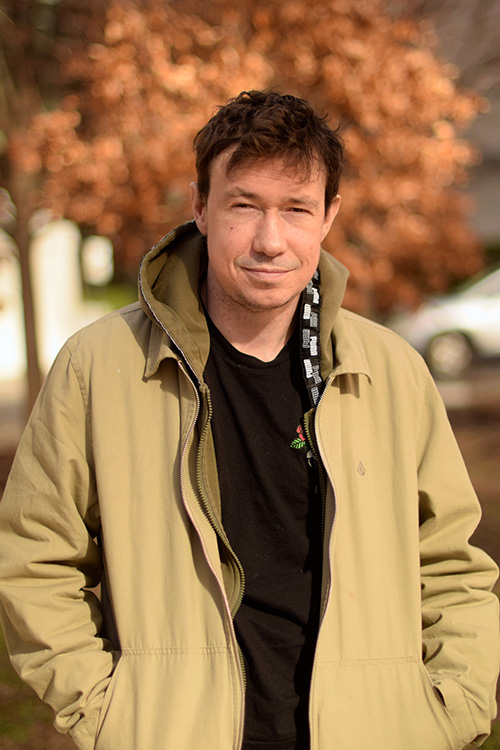
Zachary Colton is still adjusting to his new – and dramatically improved – life.
Enjoying a meal. Being pain free. Looking to the future with optimism.
“I can’t believe how well things are going at this point,” says Zachary, 35, who about six months ago had a rare five-organ transplant – stomach, pancreas, liver, large intestine, small intestine – at UHN’s Ajmera Transplant Centre.
The surgery last fall was the culmination of nearly two decades of what Zachary describes as “just surviving day-to-day” with a debilitating genetic impairment of his intestinal function. Known as hollow visceral myopathy, it essentially shut down his digestive system, eventually causing excruciating pain and repeated vomiting, forcing him to eat by intravenous tube and use an ostomy bag for bodily waste.
“It’s like I lost everything when I was 16 and now I’m pretty much getting everything back,” he says.
As unique as Zachary Colton’s case is – one of three multi-organ transplant surgeries done at UHN last year – his demand for life-saving organ transplantation is far from rare. Across Ontario and Canada, there are many people with end-stage organ disease on transplant waitlists, including those receiving kidney dialysis, diagnosed with lung fibrosis or end-stage liver disease to name but a few.
“The demand far outweighs the supply,” says Dr. Deepali Kumar, Program Medical Director at the Ajmera Transplant Centre. “Many people will not make it to transplant because there just aren’t enough organs.”
April is Be A Donor Month, supported and promoted by Trillium Gift of Life Network (TGLN). In Ontario, 1,400 people on average are waiting for a lifesaving organ. Every three days, someone on a waitlist dies.
Focusing on ‘the whole continuum of care’
UHN operates Canada’s largest transplant program. In 2023, the Ajmera Transplant Centre completed a record 715 transplants – 586 deceased donations, 129 living donations – fifth-most in North America.
“We’re doing the best we can to transplant as many people as possible,” Dr. Kumar says.
It’s a multi-faceted approach to increase the supply of organs for donation, she says.
With deceased donation, it’s about raising awareness of people around the importance of signing a donor card and making family aware of last wishes, Dr. Kumar says. For the clinical teams, it’s about “the whole continuum of care,” she says, from respecting and honouring donors and their families to ensuring the gifted organ is fully utilized and provides recipients with longevity and quality of life.
“It’s something we never take lightly,” Dr. Kumar says of the deceased donation process.
“We want to honour that patient’s wish but know it’s such a difficult time in the lives of families who have just lost someone, sometimes very suddenly,” she says. “But just the act of consenting, knowing that your loved one’s organs are going to live on in someone else, can give meaning to a terrible event and offer people a bit of closure.”
Dr. Kumar describes living organ donation – liver and kidney – as a “double-positive” because it gives recipients a new lease on life while making space on a waitlist for someone else to get a donor organ.
“Our donor outcomes are excellent and our donors are fulfilled,” she says of living donors. “It’s something they’re doing totally altruistically, which makes them real heroes, as are our deceased donors.”
Recognition that without donation ‘they most likely wouldn’t be alive’
Dr. Mark Cattral, who along with fellow Ajmera Transplant Centre surgeon Dr. Anand Ghanekar led Zachary’s surgery, credits “the incredible team of dedicated people” for its success.
“Everything has gone well for him,” says Dr. Cattral, who visited Zachary most days in the many weeks between his surgery last fall and discharge in late February from Toronto General Hospital. “He needed a lot of support from the entire team and there’s been a few bumps along the way, but his course has been relatively smooth and we’re very pleased with the results.”
Dr. Cattral says in more than 30 years of transplantation surgery he’s read many letters of thanks from organ recipients to the families of deceased donors – and living donors – for the gift they have received.
“They express a sincere gratitude to the donor and the donor’s family,” Dr. Cattral says. “They recognize that without that donation they most likely wouldn’t be alive.”
No one needs to tell Zachary Colton his deceased donor is a hero.
“Whoever that person is, they completely and utterly changed my life,” he says. “And, now I have to do something with it, which is daunting as hell but also an incredible gift.”
Zachary is already enrolled in online academic courses and is hoping to soon move back to his hometown of Ottawa and go to Carleton University. His plan is to study to become a pharmacist “specializing in IV nutrition, which is what has sustained me for the past 18 years.”
Planning for a future that stretches beyond getting through the next day still feels “amazing,” he says.
“No one expected me to survive this long, or to make it to this point. It’s kind of incredible that I not only survived to here, but that this has worked out as well as it has.
“It looks like I have a life ahead of me now.”

No one ever changed the world on their own but when the bright minds at UHN work together with donors we can redefine the world of health care together.
